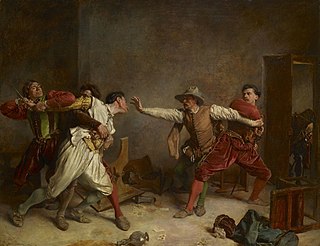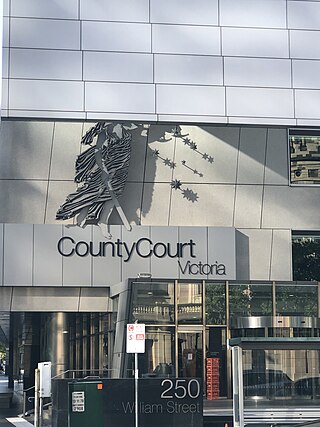
In many legal jurisdictions related to English common law, affray is a public order offence consisting of the fighting of one or more persons in a public place to the terror of ordinary people. Depending on their actions, and the laws of the prevailing jurisdiction, those engaged in an affray may also render themselves liable to prosecution for assault, unlawful assembly, or riot; if so, it is for one of these offences that they are usually charged.

In many common law jurisdictions, an indictable offence is an offence which can only be tried on an indictment after a preliminary hearing to determine whether there is a prima facie case to answer or by a grand jury. A similar concept in the United States is known as a felony, which for federal crimes, also requires an indictment. In Scotland, which is a hybrid common law jurisdiction, the procurator fiscal will commence solemn proceedings for serious crimes to be prosecuted on indictment before a jury.
A hybrid offence, dual offence, Crown option offence, dual procedure offence, offence triable either way, or wobbler is one of the special class offences in the common law jurisdictions where the case may be prosecuted either summarily or on indictment. In the United States, an alternative misdemeanor/felony offense lists both county jail and state prison as possible punishment, for example, theft. Similarly, a wobblette is a crime that can be charged either as a misdemeanor or an infraction, for example, in California, violating COVID-19 safety precautions.

In law, a committal procedure is the process by which a defendant is charged with a serious offence under the criminal justice systems of all common law jurisdictions except the United States. The committal procedure replaces the earlier grand jury process.

The Offences against the Person Act 1861 is an Act of the Parliament of the United Kingdom of Great Britain and Ireland. It consolidated provisions related to offences against the person from a number of earlier statutes into a single Act. For the most part these provisions were, according to the draftsman of the Act, incorporated with little or no variation in their phraseology. It is one of a group of Acts sometimes referred to as the Criminal Law Consolidation Acts 1861. It was passed with the object of simplifying the law. It is essentially a revised version of an earlier Consolidation Act, the Offences Against the Person Act 1828, incorporating subsequent statutes.

The Theft Act 1978 is an act of the Parliament of the United Kingdom. It supplemented the earlier deception offences contained in sections 15 and 16 of the Theft Act 1968 by reforming some aspects of those offences and adding new provisions. See also the Fraud Act 2006.
False accounting is a legal term for a type of fraud, considered a statutory offence in England and Wales, Northern Ireland and the Republic of Ireland.

The Malicious Damage Act 1861 is an Act of the Parliament of the United Kingdom of Great Britain and Ireland. It consolidated provisions related to malicious damage from a number of earlier statutes into a single Act. For the most part these provisions were, according to the draftsman of the Act, incorporated with little or no variation in their phraseology. It is one of a group of Acts sometimes referred to as the Criminal Law Consolidation Acts 1861. It was passed with the object of simplifying the law. It is essentially a revised version of an earlier consolidation Act, the Malicious Injuries to Property Act 1827, incorporating subsequent statutes.

The Official Secrets Act 1911 was an Act of the Parliament of the United Kingdom. It replaces the Official Secrets Act 1889.

The Official Secrets Act 1989 is an Act of the Parliament of the United Kingdom that repeals and replaces section 2 of the Official Secrets Act 1911, thereby removing the public interest defence created by that section.
Obtaining pecuniary advantage by deception was formerly a statutory offence in England and Wales and Northern Ireland. It was replaced with the more general offence of fraud by the Fraud Act 2006. The offence still subsists in certain other common law jurisdictions which have copied the English criminal model.

The Serious Crime Act 2007 is an Act of the Parliament of the United Kingdom that makes several radical changes to English criminal law. In particular, it creates a new scheme of serious crime prevention orders to frustrate crime in England and Wales and in Northern Ireland, replaces the common law crime of incitement with a statutory offence of encouraging or assisting crime, makes provision as to disclosure and information sharing in order to prevent fraud, and abolishes the Assets Recovery Agency creating a new regime for the recovery of the proceeds of crime.

The Criminal Justice and Immigration Act 2008 is an Act of the Parliament of the United Kingdom which makes significant changes in many areas of the criminal justice system in England and Wales and, to a lesser extent, in Scotland and Northern Ireland. In particular, it changes the law relating to custodial sentences and the early release of prisoners to reduce prison overcrowding, which reached crisis levels in 2008. It also reduces the right of prison officers to take industrial action, and changed the law on the deportation of foreign criminals. It received royal assent on 8 May 2008, but most of its provisions came into force on various later dates. Many sections came into force on 14 July 2008.
Burglary is a statutory offence in England and Wales.

The Sexual Offences (Amendment) Act 1976 is an act of the Parliament of the United Kingdom. It made provision in relation to rape and related offences. Except for subsections (1) and (2) and (4) and (6) of section 7, the whole Act is repealed. Section 7(2) now provides the definition of the expression "a rape offence" in relation to court martial proceedings. The other remaining provisions are purely supplemental.
Removing article from place open to the public is a statutory offence in England and Wales and Northern Ireland.

The Magistrates' Courts Act 1952 was an Act of the Parliament of the United Kingdom which related to magistrates' courts. It was repealed by section 154 of, and Schedule 9 to, the Magistrates' Courts Act 1980.
Assault with intent to resist arrest is a statutory offence of aggravated assault in England and Wales and Northern Ireland and the Republic of Ireland.

The Genocide Act 1969 was an Act of the Parliament of the United Kingdom. It gave effect to the Convention on the Prevention and Punishment of the Crime of Genocide approved by the General Assembly of the United Nations on 9 December 1948.

The Criminal Justice Act 1988 is an Act of the Parliament of the United Kingdom.







